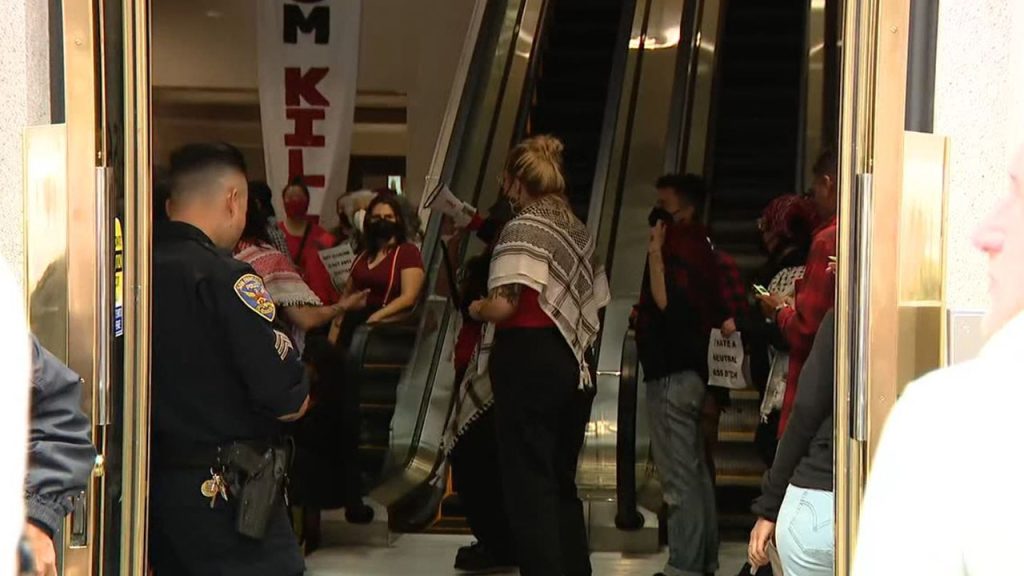Nearly 100 anti-Israel activists stormed and occupied the lobby of the Israeli Consulate in San Francisco, leading to several arrests after they refused to leave. The activists, estimated at around 100, were removed from the consulate by police, with at least a dozen detained in the process. Despite being warned multiple times to vacate the building, the protesters insisted on remaining until forced out. The demonstrators reportedly stated they would not leave unless compelled to do so, which led to police blocking the doors and ordering them to vacate the premises. Fortunately, no staff members were injured during the incident.
Consul General Marco Sermoneta expressed outrage at the actions of the protesters, describing their attempt to disrupt the operations of the diplomatic mission as appalling but not surprising. He emphasized that the individuals who entered the consulate lobby were the same people who had previously celebrated the violent acts committed against Israelis. Sermoneta linked the incident to Hamas’ invasion of Israel and highlighted the hostile environment that Jewish individuals have been subjected to in the Bay Area, especially on college campuses. He noted that the presence of anti-Israel mobs has made it dangerous for Jews and has tainted city council meetings with antisemitism and mass-atrocity denial.
The consulate spokesperson thanked the San Francisco Police Department for their swift response to the situation and assured that normal services would continue to be provided. The incident occurred during a period of heightened tensions, with Hamas being accused of using campus groups in the United States to recruit future leaders into terrorist activities. This context adds to the concerns raised by Sermoneta regarding the safety of Jewish individuals in the Bay Area. The consulate’s ability to operate as a diplomatic mission was briefly compromised by the protesters, but authorities were able to resolve the situation and remove the demonstrators from the premises.
Protests against Israel and support for Hamas have been on the rise in the United States, with some groups being accused of endorsing terrorist activities. A major US law firm recently filed a lawsuit against Students for Justice in Palestine for their alleged backing of Hamas as a terrorist organization. These developments reflect broader geopolitical tensions and ideological divides that have spilled over into domestic activism. President Trump has also expressed his intention to address what he perceives as a radical revolution on college campuses and to crack down on anti-Israel agitators, suggesting that they should be sent out of the country. This stance further complicates the already contentious debate surrounding Israel and its relations with various activist groups.
The occupation of the Israeli Consulate in San Francisco and the subsequent arrests of anti-Israel protesters highlight the ongoing conflict and polarization surrounding the Israeli-Palestinian issue. The incident serves as a microcosm of the broader struggle for peace and justice in the Middle East, with competing narratives and interests shaping the discourse on both sides. The consulate’s response underscores the challenges faced by diplomatic missions in navigating complex political environments and ensuring the safety and security of their staff. The event also raises questions about the limits of free speech and peaceful protest, as well as the role of law enforcement in maintaining order and upholding diplomatic norms.
In a global context marked by escalating tensions and violence, the actions of anti-Israel activists in San Francisco resonate with larger debates and conflicts unfolding around the world. The intersection of domestic protests with international diplomatic relations showcases the interconnected nature of contemporary geopolitical issues and the challenges of finding peaceful resolutions to complex conflicts. The incident at the Israeli Consulate underscores the need for dialogue, understanding, and de-escalation in addressing the root causes of conflict and working towards a more inclusive and sustainable future for all involved parties. As the aftermath of the protest continues to unfold, the importance of diplomacy, respect for human rights, and dialogue cannot be understated in seeking lasting solutions to longstanding grievances and divisions.


